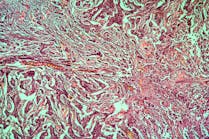New study shows certain combinations of antiviral proteins are responsible for lupus symptoms and affect treatment outcomes
In a new study, researchers from Johns Hopkins Medicine say they have uncovered insights as to why lupus symptoms and severity present differently in individuals with the autoimmune condition, which affects up to 1.5 million Americans.
The team says this is a crucial step forward in understanding biological mechanisms behind lupus and may also lead to shifts in how clinicians treat patients with the condition.
The full report, published in Cell Reports Medicine on May 13, concludes that specific combinations and elevated levels of immune system proteins, known as interferons, are associated with certain lupus symptoms such as skin rashes, kidney inflammation and joint pain. Interferons normally help to fight infection or disease, but are overactive in lupus, causing widespread inflammation and damage. The study also shows that other common lupus-related symptoms cannot be explained by increased interferon levels.
Some lupus treatments are designed to suppress a specific group of interferons, known as interferon I. In clinical trials for these treatments, the team observed some patients failing to improve, despite genetic tests showing high interferon I levels before treatment, or what experts call a high interferon signature. The team believed that two other interferon groups, interferon II and interferon III, may be to blame for these poor treatment responses.
To investigate, the team looked at how different combinations of interferon I, II or III, and their overactivity may present in people with lupus. Researchers took 341 samples from 191 participants to determine the activity of the three interferon groups and used human cell lines engineered to react to the presence of each specific interferon group to analyze the samples. Through this process, researchers determined that the majority of participants fell into four categories: those only with increased interferon I; those with a combination of increased interferons I, II and III; those with a combination of increased interferons II and III; or those with normal interferon levels.
Researchers were able to use these findings to also make several associations between these interferon combinations and lupus symptoms. In those with elevated interferon I, lupus was mainly associated with symptoms affecting the skin, such as rashes or sores. Participants with elevated levels of interferon I, II and III exhibited the most severe presentations of lupus, often with significant damage to organ systems, such as the kidneys.
Not every symptom found in lupus was associated with elevated interferons, though. The formation of blood clots and low platelet counts, which also affect clotting, did not have an association with increased levels of interferon groups I, II or III. Researchers say this indicates that both interferon-dependent and other biological mechanisms are involved in this complex disease. The study also found that genetic testing of genes associated with these interferon groups, or the interferon signature, did not always indicate elevated interferon levels. They plan to investigate this in future studies.





